Corporate governance report
At AEEI, we believe that effective corporate governance is critical to delivering on our Vision 2020 Vision’s strategic objectives and creating long-term value for our shareholders. Our governance framework is clear and consistent in terms of delegation of authority from our Board of directors to senior levels within our Group, and it is continuously refined.
STATEMENT OF COMMITMENT
The Board is committed to the highest standards of ethics, governance and business integrity and has adopted an integrated approach to managing the Group. This ensures that the governance structure actively identifies, communicates on and responds to material matters that impact on the Group’s capacity to create value. The Board believes that it has addressed all material matters appropriately and that it fairly represents the integrated performance of the Group. The Board continuously reviews the Group’s governance structures and processes to incorporate and accommodate new corporate developments, to facilitate effective leadership, to provide sustainable corporate citizenship in support of the Group’s strategy, and to reflect national and international corporate governance standards, developments and best practices. ( – Principle 6)
– Principle 6)
Due to the restructure of the Board during the year, the audit and risk committee was affected and was seen to be non-compliant from 18 April to 23 September 2019. As at the reporting date, the audit and risk committee is compliant.
The Board is satisfied that effective controls have been implemented and complied with throughout the Group, and that the Company fully complies with the spirit and form of the continuing obligations of the JSE Listings Requirements, King IV™ and the Companies Act.
CREATING VALUE THROUGH SOUND CORPORATE GOVERNANCE
Sound corporate governance and ethics form the foundation of AEEI’s business and are pivotal in delivering long-term value to our stakeholders. AEEI has a positive association with all its stakeholders and is committed to the highest standards of ethics and business integrity in all its activities.
OUR GOVERNANCE FRAMEWORK
The Board is the principal decision-maker and is supported by various committees and the executive management team. The Board is responsible for the strategic direction of the Group’s and the Company’s governance framework. The governance framework supports the Company’s strategic focus areas.
The Board plays a pivotal role in strategy planning and has established clear key performance indicators to measure the strategic objectives of the Company. The Board ensures that its sound governance framework will enhance good corporate governance, improve internal controls and enhance the Company’s performance.
The Board has an oversight role in terms of carrying out the strategic objectives of the Company and is assisted by the necessary committees, including the executive committee, with clear terms of reference to assist in discharging its responsibilities. This flows to the subsidiaries and divisional levels to ensure that the business is provided with a structure within which management can operate effectively.


The Group’s governance framework focuses on the following:
- Vision, strategy and performance
- Ethical and responsible leadership
- Finance, including budgets and forecasts
- Corporate citizenship
- Risk management
- Information technology
- Investment
- Products – quality, cost, delivery and competitiveness
- Human capital – health, safety, employee wellness and the environment
- Transformation
- Sustainability
- Stakeholder relations
As AEEI is listed on the JSE, the Company is subject to and has implemented controls to provide reasonable assurance of compliance with all relevant regulatory requirements in respect of its listing. Due to the restructure of the Board during the year, the audit and risk committee was affected and was seen to be noncompliant from 18 April to 23 September 2019. As at the reporting date, the audit and risk committee is compliant. AEEI has applied all the principles of King IV™ as set out in the online governance register. (










ETHICAL AND RESPONSIBLE LEADERSHIP
The Board provides effective leadership based on a principled foundation and the Group subscribes to the highest ethical standards. Responsible leadership, instilled by the values of responsibility, transparency, accountability and fairness, has been a defining characteristic of the Company since its inception.
AEEI’s fundamental objective has always been to do business ethically while building a sustainable company that recognises the short and long-term impacts of its activities on the economy, society and the environment.
The Group is governed by its Code of Ethics and Code of Conduct. The Code of Ethics requires all directors, management and employees to obey the law, respect others, to be honest and fair, and to protect the environment. The Code of Conduct articulates AEEI’s commitment to doing business according to best practices – the right way and guided by our values. (










At 31 August 2019, the Board comprised of seven directors of whom five serve as non-executive directors and two as executive directors. The Board is satisfied that its composition contains the appropriate knowledge, skills, experience, independence, and race and gender diversity. The Board operates in terms of a board-approved charter and there is a clear division of responsibilities at Board level to ensure a balance of power and authority. No one individual has unfettered powers of decision-making.
The Board is satisfied that it has discharged its duties and obligations as described in the Board Charter during the year under review.
BOARD COMPOSITION – GENDER AND RACE DIVERSITY
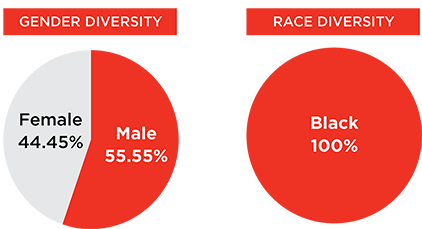

APPOINTMENTS TO THE BOARD
As required by the terms of the Company’s Memorandum of Incorporation (MOI), no director is appointed for life or for an indefinite period and the directors rotate in accordance with the provisions set out in the MOI. All directors retire from office provided that, if a director is appointed as an executive director or an employee of the Company in any other capacity, he or she shall not, while he or she holds that position or office, be subject to retirement by rotation and he or she is not in such case taken into account in determining the rotation or retirement of directors.
Appointments to the Board are formal and transparent and a matter for the Board as a whole. The Board specifically considers the independence of directors and their other commitments when they are first appointed, as well as annually, or at any other time when a director’s circumstances change and warrant re-evaluation. This is done to determine whether the director has sufficient time to discharge his or her duties effectively and is free from conflicts that cannot be managed satisfactorily.
COMPANY SECRETARY
The company secretary is accountable to the Board. Mr Damien Terblanche was appointed as the company secretary to the Board and committees, effective 4 September 2018.
During the year, the company secretary provided guidance to the directors in terms of their duties, responsibilities and powers as well as their responsibilities and liabilities under the Companies Act. The Board was made aware of changes to any relevant law affecting the Company. The company secretary prepared board packs and recorded detailed minutes of meetings.
The company secretary ensured that Board and committee meetings and the AGM of the Company were conducted in a proper and orderly manner. The company secretary disclosed the corporate actions, SENS announcements and directors’ dealings in securities, and ensured compliance with the JSE Listings Requirements and the Companies Act.
The Board has considered the competence, qualifications and experience of the company secretary and is satisfied that they are appropriate. All directors have unlimited access to the services of the company secretary. The company secretary’s appointment and removal is a matter for the whole Board.
The Board is satisfied that an arm’s length relationship exists between the company secretary and the Company, as he is not a member of the Board, is not involved in the day-to-day operations of the Company and is not a prescribed officer.
CHANGES TO THE BOARD
Messrs AM Salie, TT Hove, JM Gaomab and Ms Z Barends did not make themselves available for re-election at the AGM held on 18 January 2019 and voluntarily elected to step down from the Board. Ms CF Hendricks voluntarily elected to step down from the Board as an executive director of the Company on 18 January 2019, but continues in her role as an executive for Corporate Affairs and Sustainability.
Mr Ismet Amod was appointed to the Board of directors as a non-executive director, effective 21 January 2019, as well as a member of the audit and risk committee.
Reverend Dr Vukile Charles Mehana resigned as an independent non-executive director of the Board and its committees, effective 14 March 2019.
Miss Moleboheng Gabriella Mosia and Mr Gaamiem Colbie were appointed to the Board of directors as independent non-executive directors, effective 30 August 2019, and Mr Jowayne van Wyk was appointed as the lead independent non-executive director, effective 23 September 2019.
BOARD COMMITTEES
The Board has the following committees in place to assist it in executing some of its duties:
- Executive committee
- Nomination committee
- Audit and risk committee
- Remuneration committee
- Social, ethics and transformation committee
- Investment committee
NUMBER OF MEETINGS HELD DURING THE YEAR
| Board | 4 |
| Audit and risk committee | 3 |
| Remuneration committee | 3 |
| Investment committee | 3 |
| Nomination committee | 1 |
| Social, ethics and transformation committee | 2 |
An informal audit and risk committee meeting was held during the year.
Due to the restructure of the Board during the year, the audit and risk committee was affected and was seen to be non-compliant from 18 April to 23 September 2019. As at the reporting date, the audit and risk committee is compliant.
DIRECTORS’ DETAILS AND ATTENDANCE AT MEETINGS


| * | The above does not include Messrs AM Salie, TT Hove, JM Gaomab, Ms CF Hendricks and Ms Z Barends who did not make themselves available for re-election at the AGM on 18 January 2019. It does not take into account Reverend Dr Vukile Charles Mehana’s resignation effective 14 March 2019. Ms MG Mosia and Mr G Colbie were appointed on 30 August 2019. |
| * | In addition, it takes into account Mr Amod’s attendance since his appointment on 21 January 2019 to the Board of directors and a member of the audit and risk and nomination committees, effective 21 January 2019. |
| * | It takes into account the appointment of Ms MG Mosia and Mr G Colbie on 30 August 2019. |
| * | It does not take into account the appointment of Mr JS van Wyk who was appointed on 23 September 2019. |
| * | It does not take into account the following committee appointments as these were made post the last committee meetings: – Audit and risk committee – Messrs Colbie and van Wyk – Remuneration committee – Mr Colbie and Ms Mosia – Social, ethics and transformation committee – Ms Mosia – Nomination committee – Mr Colbie – Investment committee – Mr van Wyk |
| * | Mrs AB Amod was appointed as the non-executive chairperson on 9 December 2019 |
EVALUATION OF THE BOARD, COMMITTEES AND INDIVIDUAL DIRECTORS
Ever-changing issues facing companies make it essential to look at the agenda items of the Board to ensure that it stays aligned with good governance and ethics, and also meets current needs, best practices and matters of strategic importance. The independence of directors and their other commitments are also evaluated.
The Board and committees were evaluated by their members. Having regard to the findings, it was concluded that the Board and committees operate efficiently, openly and transparently, and there is a good level of discussion between members and attendees. The findings addressed some areas for improvement which will be addressed appropriately.
GENDER AND RACE DIVERSITY POLICIES
- Gender diversity policy: The committee will consider candidates on merit against objective criteria and with due regard to the potential benefits of gender diversity at Board level. The committee will continue to discuss and annually agree on all measurable targets in terms of gender diversity on the Board.
- Race diversity policy: The Company believes that race diversity at Board level maximises opportunities to achieve its business goals through an informed understanding of the diverse environments in which we operate. The committee assessed the composition and recommended the appointment of directors as a truly diverse Board, which includes the differences in age, gender, race, skills and industry experience, and other distinctions between directors. The selection of Board members is made on merit, in the context of their skills, experience, independence and knowledge, which the Board as a whole requires to be effective. The committee considered candidates on merit against objective criteria and with due regard to the potential benefits of race diversity at Board level. The committee will continue to discuss and annually agree all measurable targets in terms of race diversity on the Board.
EXECUTIVE COMMITTEE
The role of the executive committee is to advise the chief executive officer and the other committee members on the decisions for which they are individually accountable. The executive committee provides input and recommendations to support the chief executive officer in exercising their authority delegated by the Board to run the business of the Group.
Key focus areas of the executive committee:
- Developing the Group’s strategy and budget for the Board’s approval
- The day-to-day operations of the Company
- Executing the strategic plan once agreed by the Board
- Assuming overall responsibility for the growth and performance of the Group
- Providing assurance to the Board in relation to the overall performance and risk management
- The custodian of good corporate governance
- Providing strategic guidance and input to the subsidiaries in the Group
- Monitoring and managing the capital requirements and allocating and investing its resources
- Responsible for the investment portfolio of the Company
- Ensuring that the Company is a respected corporate citizen
- Receives reports, plans and provides input to subsidiaries in the Group
The Board is satisfied that the executive directors and their teams are adequately resourced and equipped to effectively manage the Group.
NOMINATION COMMITTEE
As at 31 August 2019, the nomination committee comprised of two non-executive directors: Mrs AB Amod is the chairperson and Mr I Amod is a member. The committee met twice during the year under review to assist the Board with the appointment of new directors by making recommendations with due regard to gender and race diversity.Messrs AM Salie, TT Hove, JM Gaomab and Ms Z Barends did not make themselves available for re-election at the AGM held on 18 January 2019 and voluntarily elected to step down from the Board. Ms CF Hendricks voluntarily elected to step down from the Board as an executive director of the Company on 18 January 2019 but continues in her role as an executive for Corporate Affairs and Sustainability.
Mr Ismet Amod was appointed to the Board of directors as a non-executive director, effective 21 January 2019, as well as a member of the audit and risk committee.
Reverend Dr Vukile Charles Mehana resigned as an independent non-executive director of the Board and its committees, effective 14 March 2019.
Ms Moleboheng Gabriella Mosia and Mr Gaamiem Colbie were appointed to the Board of directors as independent non-executives, effective 30 August 2019. Mr Colbie was appointed to the audit and risk, remuneration, nominations and investment committees and Ms Mosia to the remuneration, social, ethics and transformation and investment committees.
Mr JS van Wyk was appointed to the Board post year end on 23 September 2019 as the lead independent non-executive and appointed to the audit and risk and investment committee.
Mrs AB Amod was appointed as the non-executive chairperson of the Board on 9 December 2019.
Due to the the restructure of the Board, the committees were reconstituted post year-end and fulfilled its statutory duties.
The full report of the nomination committee, detailing how the committee discharged its duties and responsibilities, can be found on pages 21 to 22 of the full corporate governance report.
AUDIT AND RISK COMMITTEE
As at 31 August 2019, the audit and risk committee comprised of one independent non-executive director and two non-executive directors: Advocate Dr NA Ramatlhodi was the chairman and the members were Mrs AB Amod and Mr I Amod. The committee met once during the year. The executive committee, external auditor, internal auditor and advisor attended by invitation and do not form part of the decision-making process of the audit and risk committee.
Risk management – The Board has delegated the management of risk to the audit and risk committee. The Board is committed to effective risk management in pursuit of the Group’s strategic objectives with the aim of growing shareholder value sustainably. The Board understands that proactive risk management is both an essential element of good corporate governance and an enabler in realising opportunities, and it continues to enhance its capabilities to anticipate risks and manage them.
Technology and information governance – The Board is responsible for technology and information governance in the Group and delegated the management of technology and information governance to the audit and risk committee to ensure the promotion of an ethical technology and information governance culture as well as awareness.
Expertise and experience of the chief financial officer and the finance function – The audit and risk committee satisfied itself, in terms of paragraph 3.84(g)(i) of the JSE Listings Requirements, that the Group CFO and the finance function have the appropriate expertise and experience, and are adequately resourced. The audit and risk committee is responsible for the oversight of risk management and technology and information. The role, responsibilities and focus areas for the year under review are comprehensively addressed in the audit and risk committee report on pages 23 to 40 of the full corporate governance report.
Due to the restructure of the Board during the year, the audit and risk committee was affected and was seen to be non-compliant pre year-end. As at the reporting date, the committee was compliant.
For the year under review, the committee was satisfied that it had fulfilled all its statutory duties assigned by the Board in terms of the board-approved charter. The chairman of the audit and risk committee reported to the Board on the activities of the committee at each Board meeting.
REMUNERATION COMMITTEE
As at 31 August 2019, the remuneration committee comprised of one independent non-executive director and two non-executive directors. Mrs AB Amod was the chairperson and the members were Advocate Dr NA Ramatlhodi and Mr I Amod. The chief executive officer and external advisor attended by invitation and do not form part of the decision-making process of the remuneration committee. The remuneration committee met twice during the year under review.
The role, responsibilities and focus areas for the yearunder review are comprehensively addressed in the remuneration committee report on pages 41 to 47 and in the full corporate governance report.
For the year under review, the committee was satisfied that it had fulfilled all its statutory duties assigned by the Board in terms of the board-approved charter. The chairperson of the remuneration committee reports to the Board on the activities of the committee at each Board meeting.
Due to the the restructure of the Board, the committee was reconstituted post year-end and fulfilled its statutory duties.
SOCIAL, ETHICS AND TRANSFORMATION COMMITTEE
As at 31 August 2019, the social, ethics and transformation committee comprised of one independent non-executive director, two non-executive directors and one executive director: Mrs AB Amod was the chairperson and the members were Advocate Dr NA Ramatlhodi, Mr I Amod and Ms CR Sing.
Members of the executive committee and the human resources department attended by invitation and do not form part of the decision-making process of the social, ethics and transformation committee. The committee met twice during the year under review.
The committee is committed to sustainable development and is therefore responsible for ensuring that the Group conducts its operations in a manner that meets existing needs without compromising the ability of future generations to meet their needs. The committee’s primary role is to support, advise and guide management’s efforts in respect of sustainable development, social and ethics matters, transformation, and to ensure the Group is seen to be a responsible corporate citizen.
One of the main purposes of the committee is to ensure compliance with the amended B-BBEE Codes of Good Practice and to measure the Company in terms of compliance with the Department of Trade and Industry’s Code of Good Practice, the JSE Listings Requirements and the B-BBEE Commission. As a responsible employer, the Group adhered to all labour legislation. Transformation goes beyond compliance with B-BBEE and is embedded in the Group’s culture, ethics and values.
The committee has oversight of the Group’s corporate social investments and social and economic development programmes.
The role, responsibilities and focus areas for the year under review are comprehensively addressed in the social, ethics and transformation committee report on pages 48 to 53 of the full corporate governance report.
For the year under review, the committee was satisfied that it had fulfilled all its statutory duties assigned by the Board in terms of the board-approved charter. The chairman of the social, ethics and transformation committee reports to the Board on the activities of the committee at each Board meeting.
Due to the restructure of the Board, the committee was reconstituted post year-end.
INVESTMENT COMMITTEE
As at 31 August 2019, the investment committee comprised of one independent non-executive director, one non-executive director and one executive director. Mrs AB Amod was the chairperson and the members were Mr K Abdulla and Advocate Dr NA Ramatlhodi. Members of the executive committee attended by invitation and do not form part of the decision-making process of the investment committee. The committee met three times during the year under review.
The committee has an independent role, operating as an overseer and making recommendations to the Board for its consideration and final approval in terms of investment opportunities. Investments are adjudicated to ensure that they are both a strategic fit with synergistic benefits to the current level of return with a reasonable payback period based on the specific industry.
The committee is well balanced with essential legal, financial and strategic expertise.
The role, responsibilities and focus areas for the year under review are comprehensively addressed in the investment committee report on pages 54 to 56 of the full corporate governance report.
For the year under review, the committee was satisfied that it had fulfilled all its statutory duties assigned by the Board in terms of the board-approved charter. The chairperson of the investment committee reports to the Board on the activities of the committee at each Board meeting.
Due to the restructure of the Board, the committee was reconstituted post year-end.
REPORTING TO STAKEHOLDERS ON STRATEGY AND PERFORMANCE
The Group’s strategy and performance are covered comprehensively in the reports of the chairperson, chief executive officer and the chief financial officer. AEEI appreciates the role of its stakeholders and remains committed to nurturing impactful relationships that deliver mutual benefits and encourage transparent, objective and relevant communication. The Group recognises that its businesses are one of the stakeholders in the socio-economic and environmental system. It is essential for the Group to compete successfully in an increasingly complex and ever-changing business environment and to systematically bring about the change needed for sustainable development.
We built and maintained trust and respect with our various stakeholders, thus ensuring a positive impact on our reputation.
AEEI places great value on its high standards of ethics, communication and transparency of information in terms of the Promotion of Access to Information Act, Protection of Personal Information Act, and other regulations and directives relating to the dissemination of information. The Company has identified stakeholder groups with whom it engages in a structured manner. Refer to key stakeholders on pages 85 to 92 for full details.
We addressed essential risks and opportunities and responded timeously and appropriately to issues raised in our interactions with our various stakeholders. (










GOVERNANCE MATTERS
The system of internal control is designed to ensure that significant risks are appropriately identified and managed, and it provides reasonable assurance that the Board can delegate risk management to the audit and risk committee. AEEI places great value on its high standards of corporate governance, ethics, communication and transparency of information in terms of the Promotion of Access to Information Act and other regulations and directives relating to the dissemination of risk with its stakeholders.
Risk management – A key component of the audit and risk committee was to review the top material risks that the Group faces in order to respond to new and emerging risks and to ensure alignment with regulatory changes as well as best practice. In doing so, the committee took into account stakeholder needs, corporate governance principles, risk trends, global trends and external dynamics. Refer to page 28 to 35 for the full risk management report of the full corporate governance report.
Compliance – The audit and risk committee is responsible for reviewing the compliance with legal, regulatory, codes and other standards, and continually monitors the implementation of the legal compliance processes. The audit and risk committee is satisfied that it has complied with all its legal, regulatory and other responsibilities during the year. (










Group internal audit – The Group internal auditor performs an independent assurance function. The Group internal auditor had unrestricted access to the Group chief executive officer, chief financial officer and the chairman of the audit and risk committee.
The primary objective of the Group internal auditor during the year was to provide independent objective assurance and consulting activity on the adequacy and effectiveness of the Group’s systems of governance, risk management and internal control and reports functionally to the audit and risk committee. The audit and risk committee monitored the effectiveness of the internal audit function in terms of its scope, independence, skills and competence, execution of its plan, and overall performance.
The Group internal auditor recommended the annual internal audit plan for approval to the audit and risk committee. The audit and risk committee approved the formal internal audit plan, which included risk-based audits and operational audit reviews of the Group’s governance and business processes for 2019. The operational internal audit plan was reviewed by an independent external firm.
The role, responsibilities and focus areas for the year under review are comprehensively addressed in the audit and risk committee report on pages 23 to 40 of the full corporate governance report.
For the year under review, the committee is satisfied that it has fulfilled all its statutory duties assigned by the Board in terms of the board-approved charter. The chairman of the audit and risk committee reports to the Board on the activities of the committee at each Board meeting.
STAKEHOLDER RELATIONSHIPS
The Group subscribes to a policy of full, accurate and consistent communication with regard to all its affairs. The Board seeks to present a balanced and understandable assessment of the Group’s position at all times when reporting to stakeholders. The integrated report deals adequately with disclosures relating to financial statements, auditors’ responsibility, accounting records, internal controls, risk management, accounting policies, adherence to accounting standards, going concern issues as well as the Group’s adherence to established codes of governance.
The role, responsibilities and focus areas for the year under review are comprehensively addressed in the stakeholders’ relations report on pages 85 to 92 – Building relationships with our stakeholders.
ENGAGING WITH OUR STAKEHOLDERS
The Group’s stakeholder engagement is governed by the recommendations of King IV™. AEEI has a stakeholder engagement framework, which includes communication guidelines and corporate identity. AEEI’s stakeholder engagement framework outlines the Company’s approach to communicating and working with its stakeholders. Engagement is an integral part of developing an understanding of our stakeholders’ needs, interests and expectations, and assists with strategic and sustainable decision-making.
Stakeholder consultation and relationship management are implemented in all divisions of the Group. Our stakeholders’ expectations are identified through regular engagements, personal interactions, and our financial and sustainability reports. The Board appreciates that it is required to provide timeous, relevant and accurate information and continually strives to maintain open direct dialogue with all its stakeholders.
AEEI regularly communicated with its stakeholders during the year, which includes the presentation of the Group’s strategy and performance. Engaging with stakeholders is decentralised and forms part of the operations of our various business units. Each business unit is required to report regularly on its stakeholder engagements. For further information, refer to page 85 – Building relationships with our stakeholders. (










This statement shows the total value created and how it was distributed.
RESPECTED CORPORATE CITIZENSHIP
The Board and management recognise that AEEI is an economic entity as well as a corporate citizen and that it has a social and moral standing in society with all the attendant responsibilities. Further information is provided in the AEEI sustainability report available online at www.aeei.co.za/integrated-report. (










ASSURANCE REPORT
As an investment holding company, AEEI does not require assurance in respect of any reports other than its financial statements. Such assurance is provided by the Group’s external auditors, BDO South Africa Inc.
APPLICATION OF AND APPROACH TO KING IV™
In supporting King IV™ the Board recognises that it is the custodian of corporate governance for the Company and ensured that directors:
- lead ethically and effectively;
- supported an ethical culture;
- set the strategic direction for the Group for the year ahead;
- approved policies and planning; and
- administered and monitored the Group’s risks and opportunities, strategy, business model, performance and sustainable development.
The Board ensured compliance with applicable laws, rules, codes and standards in a way that supported the Group in being ethical and a good corporate citizen. It ensured that remuneration is fair and transparent and that the integrity of information for decision-making internally and externally was assured. A stakeholder inclusive approach was applied in the Group to ensure that the needs, interests and expectations of material stakeholders were addressed.
  |
A statement on AEEI’s application of the principles of the King IV™ is available on www.aeei.co.za/king-iv-on-corporate-governance/. |
AEEI has applied all the principles of King IV™.
KING IV™ GOVERNANCE PERFORMANCE


2019 VALUE DISTRIBUTION


CORPORATE GOVERNANCE STRUCTURE
Click on the image below to view the PDF.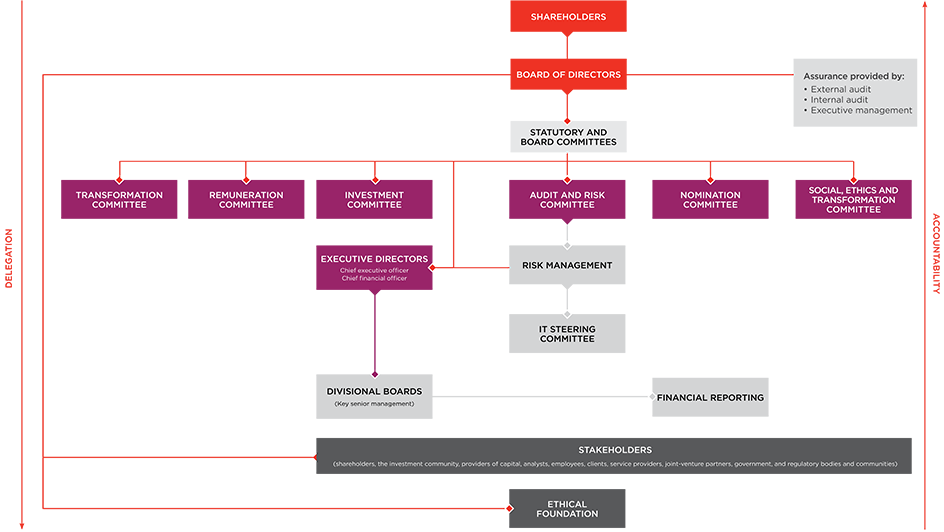

OUR EFFECTIVE LEADERSHIP
In terms of AEEI’s Memorandum of Incorporation and Board Charter, the Board is responsible for the strategic direction and ultimate control of the Company.
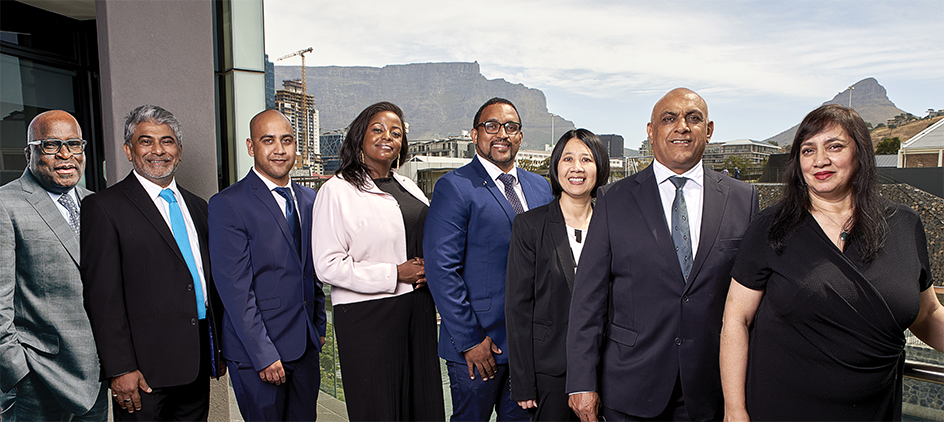

| (left to right) | Advocate Dr Ngoako Abel Ramatlhodi, Ismet Amod, Gaamiem Colbie, Moleboheng Gabriella Mosia, Jowayne van Wyk, Chantelle Rae Ah Sing, Khalid Abdulla, Aziza Begum Amod |
INTRODUCING OUR BOARD OF DIRECTORS
The diversity and skills of our Board ensure that the Group is steered to deliver growth to all our stakeholders.
Executive directors


Chief executive officer
Khalid Abdulla (54)
Appointed: 29 August 2007
Nationality: South African
Board committee: Investment committee
Expertise and experience: Mr Abdulla is the Group chief executive officer (CEO) of AEEI and has been with the Group since 1999. He served as the CEO of various subsidiaries, i.e. the information technology and financial services businesses, and as Group chief financial officer (CFO) in 2007 before being appointed as Group CEO in November 2009.
Mr Abdulla has been appointed to and serves on various boards, committees and non-governmental organisations (NGOs). He has more than 30 years’ commercial experience related to fishing, technology, health, biotherapeutics, events and tourism, and financial services. He is a regular invitee to and participant at the World Economic Forum in Africa as well as the Summer Davos in China. He was a speaker for the Department of Trade and Industry at conferences in the United Kingdom and Germany for “Investing into South Africa”.
Mr Abdulla is the recipient of many awards, including the Global Leadership Excellence Award presented at the World Leadership Congress and Awards, which took place in Mauritius; overall winner of the Inaugural South African Vision 2030 Future Maker: Driver for Change 2017 Award; and the overall winner at the Oliver Empowerment Awards as SA’s Most Empowered Business Leader of the Year (2017). Financial Mail voted him as one of the best CEOs in the country in 2016 and also ranked him among the 10 best executives of 2015. Mr Abdulla was the recipient of the prestigious Black Business Executive Circle/Absa Bank Kaelo Award for giving guidance and leadership to grow junior and middle management.
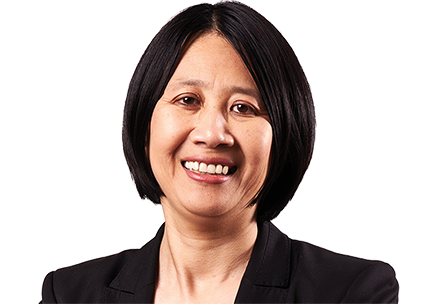

Chief FINANCIAL officer
Chantelle Rae Ah Sing (45)
Appointed: 19 November 2009
Nationality: South African
Board committee: Social, ethics and transformation committee
Expertise and experience: Ms Ah Sing is the Group CFO of AEEI and was appointed to the Board as an executive director in November 2009. She joined the Group in 2007 under the health and biotherapeutics divisions, where she was promoted to the role of financial director. She has more than 15 years’ experience in the commercial sector and held various operational and financial management positions within various industries including service, manufacturing, healthcare and biotechnology after she qualified as a chartered accountant.
Non-executive board members
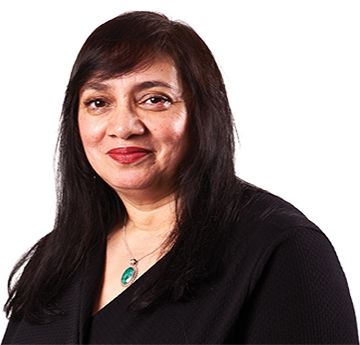

NON-EXECUTIVE CHAIRPERSON
Aziza Begum Amod (57)
Appointed: 12 November 2012
Nationality: South African
Board committees: Audit and risk committee (stepped down post year-end) Nomination committee Remuneration committee Investment committee Social, ethics and transformation committee
Expertise and experience: Mrs Amod is a professional director, businesswoman, philanthropist and entrepreneur with more than 30 years of business experience in the retail sector. She provides consultancy to women-owned businesses in the areas of impact investment, social innovation and technology applications for social impact in the food and retail sector.
Mrs Amod has been featured and published in numerous articles in relation to business and female entrepreneurs. She is a well-known philanthropist supporting several NGOs, outreach programmes and serves on the board of trustees of numerous philanthropic associations. She currently serves as a director and trustee on various business entities and trusts.
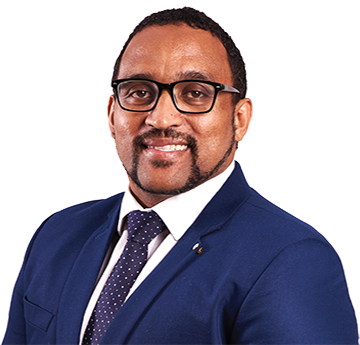

LEAD INDEPENDENT NON-EXECUTIVE DIRECTOR
Jowayne van Wyk (33)
Appointed: 23 September 2019
Nationality: South African
Board committees: Audit and risk committee (appointed post year-end) Investment committee (appointed post year-end)
Expertise and experience: Mr van Wyk is a qualified CA(SA) registered with the South African Institute of Chartered Accountants (SAICA) and holds a SAICA Independent Reviewer Certificate. He also holds a BAcc Honours and a BComm degree from Stellenbosch University. Mr van Wyk is currently the financial director for Van Wyk Chartered Accountants and the financial controller for Guala Closures South Africa and has over 10 years’ experience in the accounting field.
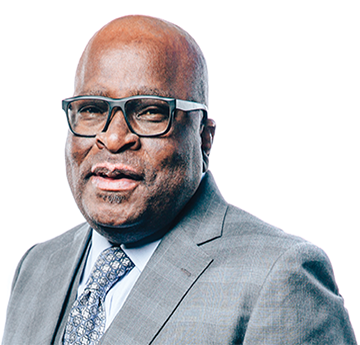

INDEPENDENT NON-EXECUTIVE DIRECTOR
Advocate Dr Ngoako Abel Ramatlhodi (64)
Appointed: 7 March 2018
Nationality: South African
Board committees: Audit and risk committee Investment committee Remuneration committee Social, ethics and transformation committee
Expertise and experience: Advocate Dr Ramatlhodi is an experienced businessman, lawyer and advocate. He was the Premier of Limpopo and held the positions of Minister of Public Services, Minister of Mineral Resources and Deputy Minister of Correctional Services and was a member of the South African Parliament. Advocate Dr Ramatlhodi is a founder member and the first chairman of the University of the North Arts and Drama Association and chairman of the Central Cultural Committee. He lectured Public International Law at the University of the North. He maintains board positions in a number of other companies.
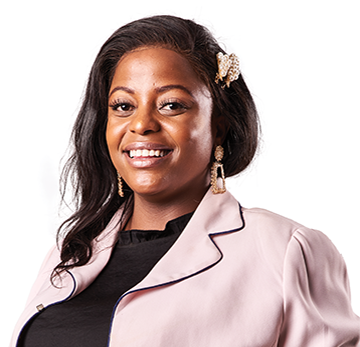

INDEPENDENT NON-EXECUTIVE DIRECTOR
Moleboheng Gabriella Mosia (27)
Appointed: 30 August 2019
Nationality: South African
Board committees: Remuneration committee Social, ethics and transformation committee Investment committee
Expertise and experience: Ms Mosia has experience in arbitration and as a legal advisor in corporate services.
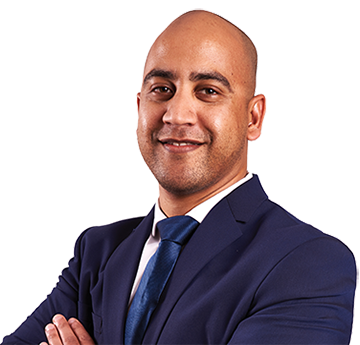

INDEPENDENT NON-EXECUTIVE DIRECTOR
Gaamiem Colbie (30)
Appointed: 30 August 2019
Nationality: South African
Board committees: Audit and risk committee Remuneration committee Nominations committee
Expertise and experience: Mr Colbie is an experienced financial professional with a history of working in a large investment holding company. In his current role he plays a lead role in the preparation of audited financial statements, tax returns, investment related reports and schedules to support financial reports. He has several years’ experience in the financial industry working in both the public and corporate sectors.
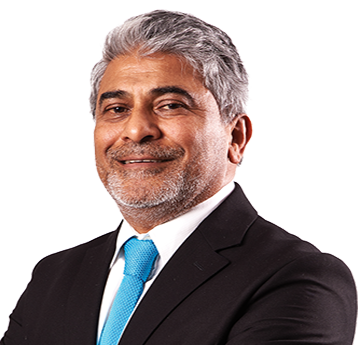

NON-EXECUTIVE DIRECTOR
Ismet Amod (63)
Appointed: 21 January 2019
Nationality: South African
Board committees: Nomination committee Remuneration committee Social, ethics and transformation committee
Expertise and experience: Having spent several years in the industry, Mr Amod completed various entrepreneurship business courses before joining a food ingredient business as a managing director. During that period, he was appointed to take charge of a subsidiary in the Sekunjalo Investment group that dealt in medical devices, and equipment.
Drawing on his engineering background, he oversaw the design, construction and project management of a new biopharmaceutical facility, ensuring that it met international Good Manufacturing Practice (GMP) specifications.
His operational experience spans a period of 32 years that covers diverse industries.
OUR EXECUTIVE TEAM
CHIEF EXECUTIVE OFFICER
Mr Khalid Abdulla is the CEO of the Group and is an executive director appointed by the Board.
During the year under review, he was responsible for leading the implementation and execution of the approved strategy, policy and operational planning. He served as the chief link between management and the Board and is accountable to the Board.
He is responsible for aiding the achievement of performance goals, objectives and targets as well as maintaining an effective management team and management structure. He continued with the implementation of the Group’s Vision 2020 Vision strategy as approved by the Board. He reviewed the annual business plans and budgets that support the Company’s long-term view and made recommendations thereon. He ensured that the appropriate policies were formulated and implemented to guide activities across the Group and ensured that effective internal organisation and governance measures were deployed.
A succession plan is in place for the CEO in the event of unplanned leave or planned resignation. (










CHIEF FINANCIAL OFFICER
Ms Chantelle Ah Sing is the CFO of the Group and is an executive director.
During the year under review, she assisted the Board to protect and manage the Company’s financial position with the assistance of the audit and risk committee. She supervises and reviews the financial statements to ensure they are fairly presented and contain the proper disclosures. She plays the overseer role to ensure the appropriate internal controls and regulatory compliance policies and processes are in place and that non-financial aspects relevant to the business of the Company were identified.
The audit and risk committee has considered the expertise and experience of the CFO and deems it appropriate. The audit and risk committee has considered and is satisfied that the finance department has the appropriate expertise and is adequately resourced. (










CORPORATE AFFAIRS AND SUSTAINABILITY
Ms Cherie Hendricks is the corporate affairs and sustainability executive.
During the year under review, she ensured an effective ethical culture and that corporate governance is maintained in the Group. She reported to the Board on social and economic development, B-BBEE, sustainable development, transformation and good corporate citizenship, with the emphasis on corporate social responsibility. She is accountable for sustainability, transformation and social responsibility programmes and develops, plans and executes the Group’s corporate affairs strategy.
She ensured regulatory compliance with the JSE Listings Requirements, Companies Act and King IV™. She wrote new policies and procedures, updated existing policies and procedures and also updated Board policies and charters in compliance with statutory, regulatory and legislative requirements for adoption and approval by the Board. She ensured that good corporate governance practices are adhered to and assisted with the governance of ethics. She ensured that stakeholder relationships and stakeholder engagement activities as well as consumer relationships, including public relations and marketing, were managed effectively.
She manages the human resources department, ensuring that fairness and ethical standards are upheld and is a primary contributor to the company secretarial department. She ensured that the human resources function and employment activities were aligned with Group policies.
She is responsible for writing the integrated report, the notice of the annual general meeting and form of proxy to the shareholders and ensured the timeous delivery thereof. (










CHIEF INVESTMENT OFFICER
Mr Wakeel Mclachlan is the chief investment officer (CIO) and is an executive.
The CIO is responsible for carrying out the duties as delegated by the investment committee. The main role of the position includes having a firm understanding of the Group’s broad growth strategy – organic and acquisitive; leading the Group’s investment strategy by providing recommendations on suitable investments; and preparing and submitting executive reports to management, the Board and clients. The CIO must maintain a broad understanding of and ensure continued development of all market securities plans to ensure satisfactory management of the Group’s investment portfolio, and must also explore innovative and new approaches to the investment process as well as strategies for generating desirable returns for all stakeholders.
During the year under review, Mr Mclachlan developed and maintained an efficient relationship with the investment committee, ensured compliance with all policies and laws while monitoring the Group’s current investments, and ensured operational efficiency across all Group entities using sound business development techniques.
He analysed the performance of the Group’s investment portfolio and presented recommendations for additional investment opportunities and potential acquisitions to the investment committee. All recommendations were based on thorough research as well as in-depth quantitative and qualitative assessments of the businesses. Investment opportunities spanned across all AEEI’s current segments and were selected based on the entities being key strategic fits within their relevant segments as well as offering future synergistic growth within the Group. All of the investment opportunities that arose were documented and analysed by preparing regular investment reports and reviews, including quantitative and qualitative portfolio studies. He reviewed quarterly financial statements and remained up to date with important valuation and policy changes.
